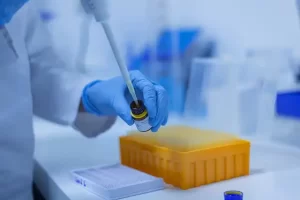VIR-1388: Clinical Trial of Preventive HIV Vaccine Begins
- Paternal Microbiome Perturbations Impact Offspring Fitness
- New Report Casts Doubt on Maradona’s Cause of Death and Rocks Manslaughter Case
- Chinese academician unable to provide the exact source of liver transplants
- Early Biomarker for Multiple Sclerosis Development Identified Years in Advance
- Aspirin Found Ineffective in Improving Recurrence Risk or Survival Rate of Breast Cancer Patients
- Child Products from Aliexpess and Temu Contain Carcinogens 3026x Over Limit
VIR-1388: Clinical Trial of Preventive HIV Vaccine Begins
- AstraZeneca Admits for the First Time that its COVID Vaccine Has Blood Clot Side Effects
- Was COVID virus leaked from the Chinese WIV lab?
- HIV Cure Research: New Study Links Viral DNA Levels to Spontaneous Control
- FDA has mandated a top-level black box warning for all marketed CAR-T therapies
- Can people with high blood pressure eat peanuts?
- What is the difference between dopamine and dobutamine?
- How long can the patient live after heart stent surgery?
VIR-1388: Clinical Trial of Preventive HIV Vaccine Begins.
A clinical trial for a candidate HIV preventive vaccine has commenced, recruiting participants in both the United States and South Africa.
The initial phase of the trial aims to assess the safety and the ability of a novel vaccine named VIR-1388 to induce HIV-specific immune responses in humans.
Scientific and financial support throughout the lifecycle of this HIV vaccine concept has been provided by the National Institute of Allergy and Infectious Diseases (NIAID), a division of the National Institutes of Health (NIH), with funding allocated for this research.

Color transmission electron micrograph of HIV-1 virions (yellow/gold) germinating from the plasma membrane of an infected H9 T cell (purple/green). Image source: NIAID/NIH
VIR-1388 is designed to instruct the immune system to generate T cells capable of recognizing HIV and emitting immune response signals to prevent the virus from establishing chronic infection.
VIR-1388 employs a cytomegalovirus (CMV) vector, meaning a weakened form of CMV is used to deliver HIV vaccine material to the immune system without causing illness in study participants.
CMV has been present in a significant portion of the global population for centuries, with most CMV infections being asymptomatic and individuals often unaware of their infection.
CMV can persistently be detected in the human body throughout life, suggesting its potential to transport and safely store HIV vaccine material over an extended period, potentially overcoming the observed immunity waning issue with shorter-lived vaccine vectors.
Funding and Collaboration
Since 2004, the National Institute of Allergy and Infectious Diseases (NIAID) has been funding the discovery and development of CMV vaccine vectors and has jointly supported this trial with the Bill & Melinda Gates Foundation and Vir Biotechnology, a biotechnology company located in San Francisco.
The trial is sponsored by Vir and conducted through the HIV Vaccine Trials Network (HVTN), funded by NIAID, known as the HVTN 142 study.
Trial Details
The HVTN 142 trial is being conducted at six sites in the United States and four sites in South Africa, enrolling 95 HIV-negative participants.
Participants will be randomly assigned to one of four study groups: three will receive different doses of the vaccine, while one will receive a placebo.
To ensure participant safety, the study will only enroll individuals who already have asymptomatic CMV.
Preliminary study results are expected to be released by the end of 2024, and an optional long-term sub-study will continue to monitor participants for up to three years following their initial vaccine administration.
For more information about this trial, please visit ClinicalTrials.gov with the research identifier NCT05854381.

HIV-infected immune cells. Image source: National Institute of Allergy and Infectious Diseases (NIAID)
More Information About HIV
HIV remains a significant global health issue with profound impacts on public health and the global economy. According to data from the World Health Organization (WHO) in 2019, an estimated 38 million people worldwide were living with HIV. During that year, approximately 1.7 million new HIV infections were reported, with 95,000 occurring in children under the age of 15. Sadly, in 2019, around 690,000 deaths were attributed to HIV-related causes.
In terms of treatment opportunities, as of the end of 2019, 81% of HIV-positive individuals knew their status, and among this informed group, 82% were eligible for antiretroviral therapy (ART). Impressively, 88% of those on ART successfully suppressed their viral load, demonstrating the effectiveness of treatment.
The Centers for Disease Control and Prevention (CDC) reported over 34,800 newly diagnosed cases of HIV in 2019 in the United States. As of the end of 2018, an estimated 1.2 million people aged 13 and older were living with HIV in the United States, with the startling fact that 14% of them were unaware of their infection. Notably, in 2019, 69% of newly diagnosed cases were among gay and bisexual men.
Over the years, prevention and mitigation strategies have continually evolved, with the use of condoms, needle exchange programs, and robust HIV awareness campaigns serving as frontline efforts in combatting the spread of HIV. Additionally, pre-exposure prophylaxis (PrEP) has shown significant efficacy, reducing the risk of HIV infection through sexual contact by nearly 99%. To improve global health, leaders around the world have set ambitious goals for 2030: 95% of people with HIV should know their status, 95% of diagnosed individuals should receive ART, and 95% of those on treatment should achieve viral suppression.
Nevertheless, challenges persist. Stigmatization and discrimination continue to be significant barriers to effective prevention, treatment, and broader support. Furthermore, despite substantial progress in some regions, disparities in accessing critical services remain. For instance, in 2019, 67% of HIV antibody-positive individuals in sub-Saharan Africa represented a startling proportion of global cases, underscoring regional disparities in this epidemic. While the world strives to address these challenges, maintaining vigilance, providing funding, and innovating approaches remain crucial in curbing the HIV epidemic.
VIR-1388: Clinical Trial of Preventive HIV Vaccine Begins
(source:internet, reference only)
Disclaimer of medicaltrend.org
Important Note: The information provided is for informational purposes only and should not be considered as medical advice.



